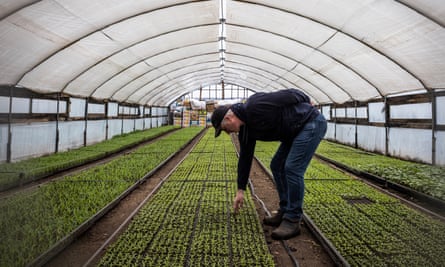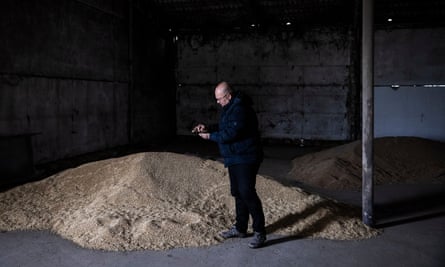Driving in his battered car, Valerii Kotenko showed off the spot where a Russian missile had landed. It had fallen next to his wheat field. “That was in December. Fortunately it didn’t explode,” he said. The enemy frequently bombed southern Ukraine, he explained, and his home in Odesa oblast. “They shoot at us like crazy. The Russians target us because they are bastards. And because we feed the world.”
Ukraine’s farmers have had a tumultuous time since Vladimir Putin’s full-scale invasion began in February 2022. Kotenko’s 120-hectare estate is a short journey from the port of Odesa on the Black Sea, hit last week by 17 Iranian drones. The rockets arrive from all directions. Russian frigates fire from the waters around occupied Crimea. Other missiles come from the east and the Sea of Azov.
In the first months of all-out war, Kotenko had to stockpile his harvest: grain, sunflower oil and tomatoes. With ports closed and road transport expensive, the market collapsed. In July 2022, Volodymyr Zelenskiy’s government signed a UN-brokered deal with Moscow to resume shipments to international destinations including Africa, Asia and the Middle East.
The Black Sea grain corridor worked. Kotenko was able to sell his crop to a commodities merchant, albeit at a low price. By the end of last week, 881 Ukrainian vessels had set off from Odesa and the ports of Pivdenny and Chornomorsk along the coast. They carried more than 27.5m tonnes of agricultural products. Much of it went to the EU.
The Kremlin has voiced dissatisfaction with the deal. It has threatened to revoke it and last month said it would only accept a 60-day extension, instead of the previous 120-day rollover. During a visit to Turkey, Russia’s foreign minister, Sergei Lavrov, complained that the west was hampering the export of Russian grain and fertiliser, and said the Kremlin might make its own bilateral deals.
Kyiv, meanwhile, accuses Moscow of sabotage. Russian, Turkish and UN inspectors check each cargo. Kyiv says the Russians deliberately frustrate the process, knocking off in the early afternoon and finding excuses to delay the work. On Tuesday, no vessels were cleared, after Russia scrubbed out the names of three ships submitted by the Ukrainian side as they returned home.
Ukraine’s deputy infrastructure minister for seaports and maritime, Yurii Vaskov, described the situation as critical. “Russia is violating the conditions of the Black Sea grain initiative. They decided to change the plans of Ukrainian ports. This is unacceptable,” he said. The Kremlin was ratcheting up the pressure because it wanted the west to drop sanctions on its agricultural sector, he said.
Vaskov warned that if the deal collapsed, global food prices would rise by 15%. More than half of Ukraine’s grain exports – 6-7m tonnes a month – went by sea, he said. On Tuesday, the UN said it was talking intensively to the parties involved. “It is in everyone’s interests to keep the initiative going,” it stressed, saying it benefited “millions of vulnerable and low-income households around the world”.
Fifty Ukrainian vessels are in an inbound queue. “The Russians think they are the boss in this situation. They believe themselves to be a superior race. They are not,” Kotenko said scornfully, describing Putin as “Russia’s Hitler”. He added: “Russia wants us to be slaves. We stopped being slaves in 1991 when Ukraine split from the Soviet Union. Now Putin wants us back in a new USSR. We are fighting against Russian fascism here.”
Kotenko’s farm is in the village of Berezan, population 1,000. In communist times, his father was the head of the collective farm. A Soviet-era irrigation system waters the fields. Prices had recovered from last year’s nadir, he said. But fuel and fertiliser were more expensive, and wartime profiteering added to bills. “I make enough to live on. The most important thing is victory,” Kotenko said.

Andriy Vadaturskyy, the chief executive of Nibulon, Ukraine’s biggest grain logistics company, confirmed that costs had skyrocketed. They had risen from $12 to $92, he said, for a tonne of wheat selling at $270. As a result, Ukrainian farmers planted 40% less crops this season. The shortfall would be felt acutely from next year, he warned, and amounted to a loss of 27m tonnes of grain.
“My fear is this could be a bomb, a migration bomb,” Vadaturskyy said. It was probable that countries in north Africa would experience hunger, which in turn drive would migration into Europe. Putin understood the situation well, he said. “The Russians behave like gangsters. They created the problem. They kill Ukrainians and don’t give a stuff for the law.”
Vadaturskyy’s father, Oleksiy, and mother, Raisa, died last July when a Russian cruise missile slammed into their villa in the port city of Mykolaiv. Oleksiy was at the time the head of Nibulon, a pro-European businessman and the vice-chairman of Ukraine’s grain association. Zelenskiy described his death as “premeditated murder”. It happened just as the first Ukrainian grain bulk carrier was about to leave.
Speaking to the Guardian, Vadaturskyy said there was no direct evidence that Moscow had assassinated his parents. But he said the missile landed in their bedroom, noting: “Windows 10 metres away were unbroken.” The firm’s 80 ships were stuck in Mykolaiv, together with 39 other vessels. Its port on the Southern Bug River is not a part of the grain initiative, meaning higher transport costs for exporters.
Andy Hunder, the president of the US chamber of commerce in Kyiv, said business wanted the corridor to be prolonged for at least one year, with Mykolaiv included. He said: “Global food supply chains and security, including world food prices and hunger rates, are at significant risk again due to the Russian side’s artificial reduction of Ukrainian grain and oilseeds export volumes.”
In another part of Odesa province, a farmer, Eugene Babalik, said he had survived last year’s challenges by borrowing $100,000. With banks unwilling to lend, the money came from a government scheme backed by the European Bank for Reconstruction and Development. The credit helped him keep going. It meant he did not have to fire any of the 12 staff who worked on his 1,600-hectare farm.

Babalik said he was in touch with farmers who had experienced Russian occupation in Kherson province. Some stayed; others fled. Soldiers stole tractors and shot up older agricultural equipment. “One friend could see from a GPS tracker that his combine harvester was in Chechnya,” he said. “They end up in Russia and Crimea.” The Russians had mined agricultural land, he said, with many farmworkers being blown up.
His farm is located close to the port of Pivdenny, a sprawling complex of silver grain chutes, truck parks and administrative buildings next to the Black Sea. Two missiles landed nearby, Babalik said. One hit a grain silo, the other an electricity substation, 700 metres from his grain shed. “Thank God our defences are working. We are used to these attacks already. It happens all the time. I don’t really hear the booms,” he said.
Kotenko, meanwhile, drove down the road to see a neighbour, Mamuka Sakeishvili, who had relocated to Ukraine from Georgia 30 years ago. Sakeishvili grew sweetcorn, aubergines and peppers in a large greenhouse. Outside, dogs howled in a muddy yard. This year’s winter had been mild and unusually wet, he said, adding that his vegetables would be sold at a local market.
Both men agreed that growing food in a time of war was patriotic, in a country that has traditionally been the world’s breadbasket. “We can’t fight if we are hungry. If we don’t sow, people will have nothing to eat,” Kotenko observed. He said he had bought a combine harvester before the invasion, ignoring the wishes of his wife who told him it was an expensive toy. Further investment would have to wait until Ukraine defeated Russia, he said.
One of the few beneficiaries of the war has been Ukraine’s wildlife, Kotenko pointed out. The authorities banned hunting last year. Kotenko said the animal population had grown. “We have a lot of hares. Also pheasants, partridges and quails,” he said, as a hare bounded on cue across his green wheatfield, disappearing in the direction of a tomato patch. “This are a good thing. We should leave them alone,” he said.

